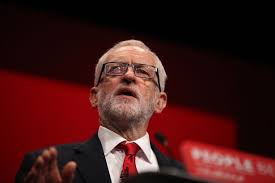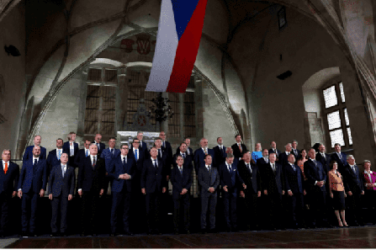It is usually assumed that the prime motive a person has when entering a contest is to win it, or at least make a good showing. Even for those entering who have little experience, the good showing is still important. It allows them to make a mark, and increase their prospects next time around. But the assumption merits examination in the light both of the contest and of the character of the person. The current case (at least until this time next week) of Mr Jeremy Corbyn in the UK is an excellent illustration of when the standard thinking does not fit the situation.
Let’s start with the man. He is now in his 36th year as a Member of Parliament. In that substantial period (half the population of the UK was not alive when Mr Corbyn entered Parliament in 1983) he has not held any ministerial post – the party to which he belongs was nevertheless in government for more than one third of that time. Moreover, he did not even have a “shadow post” (meaning he followed a specific portfolio, e.g. foreign affairs, without actually being Minister) throughout the 30+ years prior to being elected Leader of the Labor Party in 2015. He has remained as the Labor MP in a constituency in the London area where the party has held a solid majority for at least half a century. He has thus had the luxury of being able to retain his own views and allegiances, surprisingly unfettered even in the period when Mr Blair was taking a more rigorous line against MPs thought not to follow “the third way”. This circumstance allowed him to build a reputation as someone of integrity, who spoke his mind and maintained his position. Given the crash of the global financial system, in which the preceding Thatcher, Major, Blair and Brown governments were perceived as lead actors and therefore as perpetrators, the savage austerity practiced under the Cameron years, and the explosion of the movements against manifold inequalities in the UK, that reputation in the socioeconomic realm was valuable when the Labor Party searched for a new leader after the 2015 electoral defeat.
Mr Corbyn was also on record as a firm opponent of the Blair government’s decision to support President Bush in the Iraq invasion of 2003, a decision that was profoundly unpopular in the UK. The subsequent revelations about government fealty and incompetence, described with a wealth of detail in the Chilcot report of June 2016, thus further underlined Mr Corbyn’s credentials as a prophet in the wilderness. In the poisonous political and social atmosphere of the UK at mid-decade, paralleled by similar situation in several other western European countries, it appeared as something amazing to observe Mr Corbyn’s singular position. The opening up of the Labor leadership election to members of the party, as opposed to earlier much more restricted processes to select a person, provided the chance for Mr Corbyn to win through. As the party understandably boasts, it has more than half a million members, and the vast majority of them are ordinary citizens, mostly of limited economic means. For them, the presence of Mr Corbyn seemed to offer what is the clarion call of the current election campaign, namely “real change”.
In my view, it is undeniable that there is much that is wrong with the UK today. Moreover, a large part of that has been wrong for a very long time. Highly pronounced regional inequalities in income, social conditions, economic structure and the availability of social services, to name but a few, have been documented and analyzed for decades (and were highly visible before the 1939-1945 war). Precious little has been done through public policy to try and alter that situation. True, those very conditions gave rise to some of the world’s finest popular musicians (The Beatles, Sting, Phil Collins and several others achieved global fame – and earned the UK valuable income from services not based in London). Yet that is not an excuse for deliberate disdain. The drive to privatize significant parts of the economy in the Thatcher years was characterized by poor conceptualization and implementation, leaving aside the political discussion as to whether it was desirable. The behavior of the UK as a member of the European Common Market, and later Union, did not help either political good relations with continental neighbors or the immense goodwill which the UK enjoyed in so many countries. The eagerness to be seen as a country always willing to become embroiled in violent conflicts was at best a double edged sword.
The context just sketched has been a very favorable one for Mr Corbyn. All the indicators looked good for a message molded around social justice; a decent balance among private, public and joint endeavors; a commitment to an open and diverse society; and actions in favor of peace. But if a message sounds promising, that in politics (and in other dimensions of life) is just a start. Any sizeable country, and the UK is in that category, carrying a complex history full of sensibilities, faces two major challenges with the message. One is to devise policies capable of convincing enough people that the real changes can be made, and will offer real benefits to them. The other is to convince enough people that you and your team have the skills, competence and adaptability to implement those policies. It is in these areas that Mr Corbyn has run into serious trouble. An election that should have been there for the taking will be lost on those counts. To understand why, we need to go a stage further, to enquire indeed whether the true purpose of competing has been to win the contest.
Convictions are in essence a good thing. They should provide a framework for assessing situations, people and policies, and for taking decisions. They should also be by and large internally consistent. Quandaries and genuinely difficult choices cannot be avoided, and will sometimes seem to present lose/lose dilemmas – as Professor Michael Sandel so clearly demonstrates in what is perhaps the most famous of all MOOCs, namely “What is Justice?” Yet life and politics do not easily tolerate shirking. Mr Corbyn presents himself as a man of convictions. But maintaining and translating those convictions in the real world when you want to make a living as a politician is a tough call.
A look at Mr Corbyn’s perspective on things reveals a peculiarly English version of what the historian E H Carr labelled, in reference to Stalin’s political shift in the late 1920s, “Socialism in One Country”. The Soviet Union in that period moved decisively to policies centered almost exclusively on its own situation, to be carried out predominantly with its own resources, with limited external trade and financial connections, and to be driven through with ferocious measures against internal opposition. In the circumstances of that huge country, and in those times, the Stalinist approach could be followed, albeit at great human cost and with appalling mismanagement. To imagine that the UK can do anything remotely similar in today’s world is a pipedream. It does not have the capabilities. It does not have the unity, nor can it enforce a unity. And it is almost certainly not what “the many” actually want. The history of the UK, and perhaps particularly of the English people, is about as different from that of the Russian people as can be imagined. Peter the Great launched his extraordinary, and very personal, campaign to drag Russia out of what he perceived as acute backwardness close on half a century after Thomas Cromwell had created his “Commonwealth”, well over a century after King Henry VIII had carried out his religious reformation, and a couple of decades after political theorists such as Hobbes and Locke had announced their messages with maximum clarity. The Russian stage of a century back, and the English stage of today, are dramatically different. The main actors and the lesser players were working from vastly different scripts and traditions.
The real choice for Mr Corbyn personally has been, and is, whether he wants to enter the messy world of decision making, where the mental architecture will be subject to permanent shocks, or whether he wants to be remembered as the man who never compromised his convictions. In fact the latter is a chimera (claiming that, as in the case, of Brexit, “democratic decisions” must be taken) – so he will not really get either. However, he has chosen to aim for a decent name in posterity – or at least that kind of posterity favored by the true believers. So the 2019 election is not a contest he wants to win. He has an opponent of no convictions, no ideas, and no integrity – hence he has no chance. As a Spanish speaker, Mr Corbyn might have recalled the old proverb saying that you can’t make a tortilla without breaking eggs. Strangely, while seeking to avoid the breaking, he ends up with egg all over his face.
Peter O’Brien, Brussels, 4 December 2019





